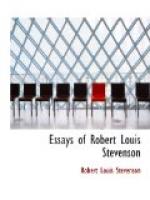[Note 15: A Soul’s Tragedy. The title of a tragedy by Browning, published in 1846.]
[Note 16: Troilus and Cressida. One of the most bitter and cynical plays ever written; practically never seen on the English stage, it was successfully revived at Berlin, in September 1904.]
[Note 17: “While the lamp holds on to burn ... the greatest sinner may return.” From a hymn by Isaac Watts (1674-1748), beginning
“Life is the time to serve the Lord,
The time to insure the great reward;
And while the lamp holds out to burn,
The vilest sinner may return.”
Although this stanza has no remarkable merit, many of Watts’s hymns are genuine poetry.]
[Note 18: Sturm und Drang. This German expression has been well translated “Storm and Stress.” It was applied to the literature in Germany (and in Europe) the latter part of the XVIIIth century, which was characterised by emotional excess of all kinds. A typical book of the period was Goethe’s Sorrows of Werther (Die Leiden des jungen Werthers, 1774). The expression is also often applied to the period of adolescence in the life of the individual.]
[Note 19: Jesuit confessors. The Jesuits, or Society of Jesus, one of the most famous religious orders of the Roman Catholic Church, was founded in 1534 by Ignatius of Loyola and a few others.]
[Note 20: Modified by Cheeryble. The Cheeryble Brothers are characters in Dickens’s Nicholas Nickleby (1838-9). Dickens said in his Preface, “Those who take an interest in this tale, will be glad to learn that the BROTHERS CHEERYBLE live: that their liberal charity, their singleness of heart, their noble nature ... are no creations of the Author’s brain.”]
[Note 21: “Rake the backets.” The “backet” is a small, square, wooden trough generally used for ashes and waste.]
[Note 22: Woggs (and Note: Walter, Watty, Woggy, Woggs, Wog, and lastly Bogue; under which last name he fell in battle some twelve months ago. Glory was his aim and he attained it; for his icon, by the hand of Caldecott, now lies among the treasures of the nation.) Stevenson’s well-beloved black Skye terrier. See Balfour’s Life_, I, 212, 223. Stevenson was so deeply affected by Woggs’s death that he could not bear ever to own another dog. A Latin inscription was placed on his tombstone.... This Note was added in 1887, when the essay appeared in Memories and Portraits. “Icon” means image (cf. iconoclast); the word has lately become familiar through the religious use of icons by the Russians in the war with Japan. Randolph Caldecott (1846-1886) was a well-known artist and prominent contributor of sketches to illustrated magazines.]
[Note 23: “Stammering Professors.” A “professor” here means simply a professing Christian. Stevenson alludes to the fact that dogs howl fearfully if some one in the house is dying.]




